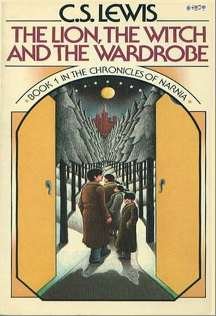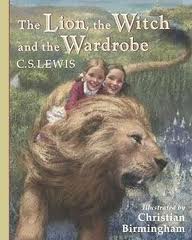What Is It About Narnia?
 What is it about the Narnia books that we love? The Lion, the Witch, and the Wardrobe, first in the order C. S. Lewis wrote the series, has four main characters and none of them is the hero. With the omniscient point of view, readers do not benefit from close character identification. The plot is straightforward, without multiple subplots, and the writing wouldn’t be considered lyrical. Why, then, do we love these books so much?
What is it about the Narnia books that we love? The Lion, the Witch, and the Wardrobe, first in the order C. S. Lewis wrote the series, has four main characters and none of them is the hero. With the omniscient point of view, readers do not benefit from close character identification. The plot is straightforward, without multiple subplots, and the writing wouldn’t be considered lyrical. Why, then, do we love these books so much?
I’ll admit, being the youngest in my family, I connected with Lucy, also the youngest of her siblings. But quickly, the story becomes much more than the tale of a brother agitating his sister, of the others not trusting her. Before the reader is half way through the book, the character we’re pulling for is … Narnia.
 We don’t want the White Witch and her wolf-guards to threaten, torture, and kill the poor people of Narnia who already are doomed to endure a winter without promise or end.
We don’t want the White Witch and her wolf-guards to threaten, torture, and kill the poor people of Narnia who already are doomed to endure a winter without promise or end.
And when Aslan returns bringing with him first Father Christmas, then Spring itself with a number of happy revilers, we see the beauty and the joy of Narnia and her king. If you take a good look at Lucy and Susan’s faces in the adjacent version of the cover, you’ll see joy radiating from them. It is this joy, I submit, that makes readers love Narnia.
Lewis, I believe, created just what he wanted to create—a world that capture wonder, or at least suggested it. In his autobiographical account of his turning to Christ, Surprised by Joy, Lewis uncovered the fleeting nature of joy that pointed to a more enduring experience. I see Narnia as Lewis’s attempt to paint joy using words.
And he succeeded.
Narnia is magic—a country found by entering a wardrobe. And it’s secret—a shared secret that extends from generation to generation.
Narnia is also marvelous. The animals talk and fauns exist and children rise to become kings and queens.
Narnia is real, symbolically so. Something inside us resonates with this place—we recognize it as the land where we want to go.
But ultimately, Narnia is Aslan. Without him, winter would rule and Narnia would be nothing but a dangerous, frozen, mirthless place. With Aslan, there’s partying and gifts and laughter, birds and flowing rivers and springtime flowers.
Perhaps the greatest thing C. S. Lewis did in The Chronicles of Narnia was to create Narnia. Yes, the stories are compelling and the characters believable. But it’s Narnia that lives in our imagination, whether we’re reading about Lucy and Edmund or Eustace and Jill. It’s Narnia that we fear for in The Lion, the Witch, and the Wardrobe, in Prince Caspian, in The Silver Chair, and it’s Narnia we fear for in The Last Battle.
No mistake, as I said earlier, Narnia is what it is because of Aslan, but in creating this remarkable world, C. S. Lewis gave readers a place like few others. And it is the place we love.





























In my ten years of loving and reading Narnia, I had never noticed this aspect! Narnia drew me, but I didn’t know why, and I didn’t question it either. Thank you for posting your observations!
Unfortunately I believe the filmmakers don’t recognize this aspect as much: that we love and delight in Narnia because of the world. It is such joy, such magic itself, that we don’t want to see it kept in a hundred years of winter, or dominated by Telmarines, or invaded by enchanted earth-gnomes, or deceived by a beastly Ape.
The Dawn Treader film invented a crisis for Narnia that was foreign to the book. But apart from that change, viewers really had no reason to “root” for Narnia other than familiarity with this place because of the last films (which showed its magic a little better, especially the first) and, for book readers, familiarity with and love for the “true” Narnia as told in the seven stories.
Litlady (if I may call you that 😉 ), thanks for your comment.
I know I hadn’t thought about why we love the books so much until recently. I guess since I’m writing fantasy, I’m more prone to ask, Why does this work?
Plus, I’ve talked with a friend who “read the books out of order” (chronologically, not in the written order my set put them in), and she said she didn’t find Lucy particularly engaging. As I mentioned, I early on identified with Lucy and wasn’t so happy when later books didn’t feature her — except, I still read them, still found them captivating, especially on subsequent readings.
That background is undoubtedly more than you wanted to know. 😀
Becky
Stephen, as I was writing the post it dawned on me that this was, above all else, what the movies got wrong.
Yes, Lion, Witch, Wardrobe did a better job than any of the others, but I’ll never forget the look on Lucy’s face when she stepped into snowy Narnia. It was a look of amazement and wonder. It was good acting, except I remember thinking at the time, she shouldn’t like it so much. Where is the concern for a Narnia always experiencing winter if winter is beautiful and amazing?
Granted, I haven’t gone back to see how Lewis wrote her reaction, so the movie may have been spot on, but that feeling has stayed with me — that the movies didn’t capture the essence of the place and the tragedy of the various threats to the country itself.
But I still want to see them keep trying. 😉
Becky
Beautiful. I mean, LWW starts with “This is a story about–” one of the oldest cliches in the book, but really, it works.